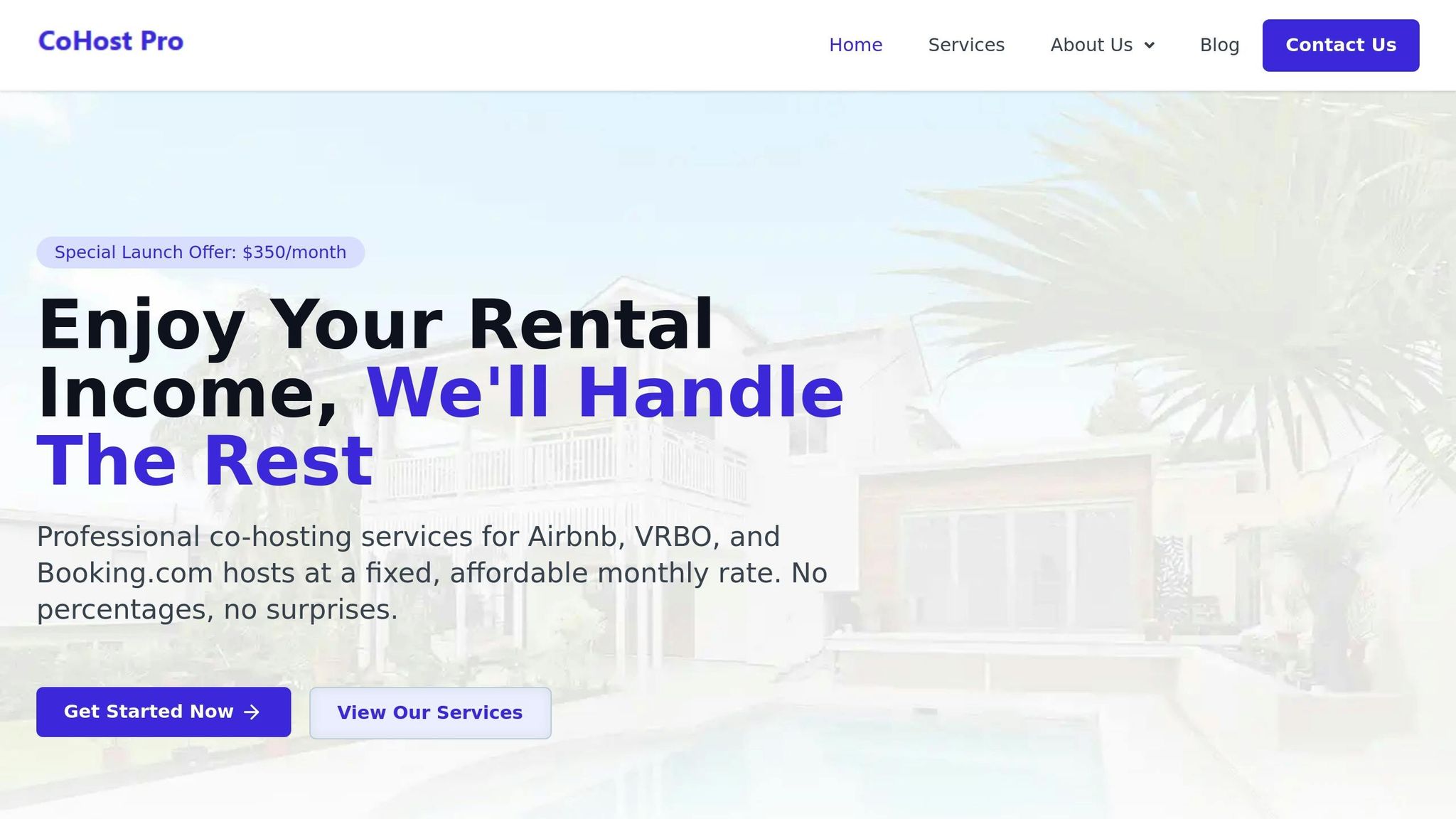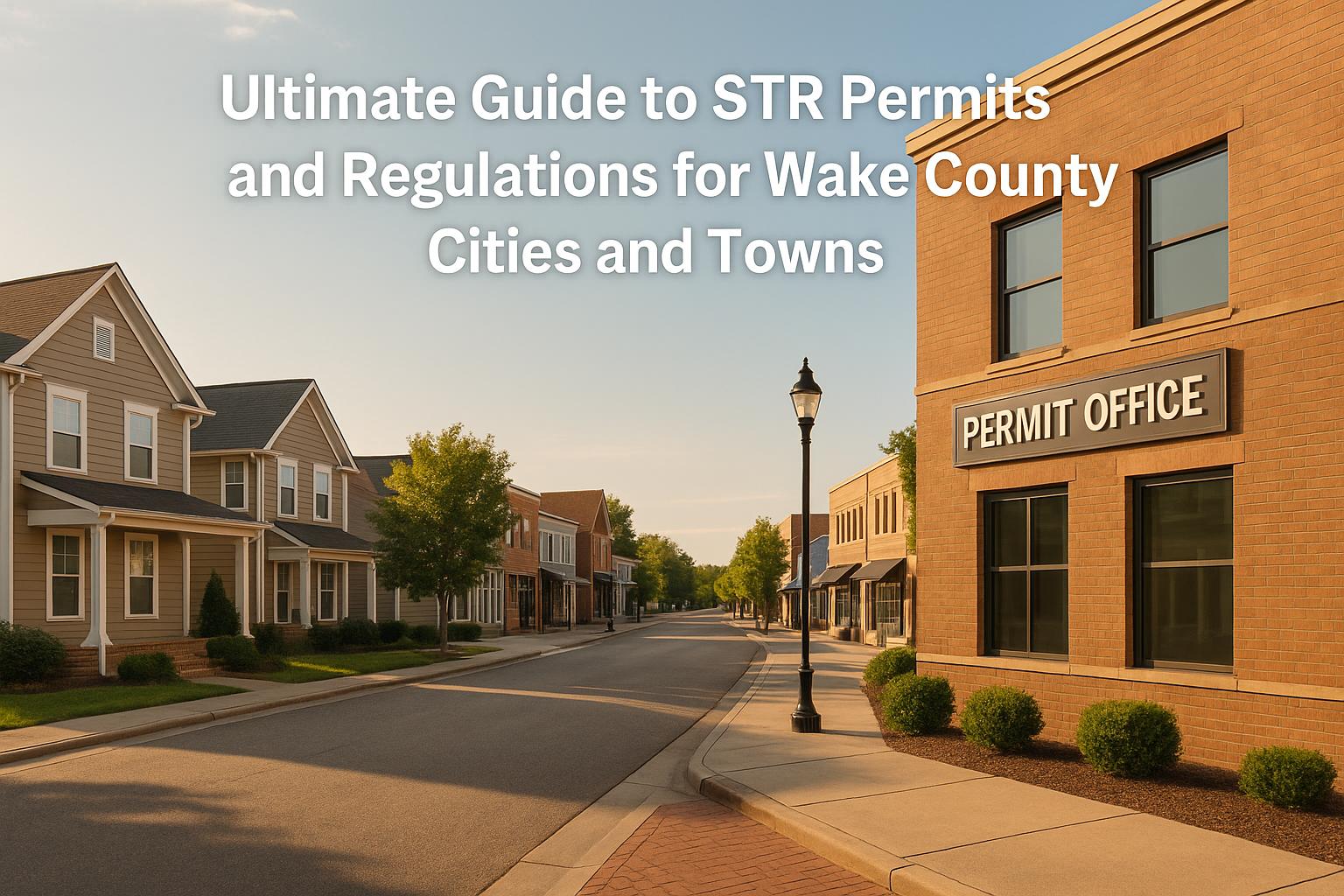Want to rent your property as a short-term rental (STR) in Wake County? Here’s what you need to know in seconds:
- Permits are required in some cities (like Raleigh) but not in others (like Cary).
- Taxes apply across all of Wake County: 12.75% total (6% room occupancy tax + 6.75% sales tax).
- Raleigh has stricter rules: You’ll need a zoning permit ($194 initial, $86 annual renewal), and only 25% of units in multi-family buildings can be STRs.
- Cary is more lenient: No permits or city-specific fees, but HOA rules may apply.
- Breaking the rules can cost you: Fines start at $100/day and can go up to $500/day in Raleigh.
Quick Comparison of STR Rules in Raleigh and Cary
| City | Permit Required | Special Events Allowed | Multi-Unit STR Limits | Permit Fees |
|---|---|---|---|---|
| Raleigh | Yes | No | 25% or 2 units min. | $194 initial, $86 annual |
| Cary | No | No city restrictions | None specified | None |
For compliance, always check your city’s specific rules, collect taxes, and keep detailed records. If managing this feels overwhelming, consider a co-hosting service like NC Host Pro to handle permits, taxes, and guest management for you.
STR Permit Requirements in Wake County
Securing a short-term rental (STR) permit in Wake County can be a bit of a process, especially since the requirements vary depending on the municipality. For example, the City of Raleigh has laid out a clear set of steps to ensure compliance.
How to Apply for STR Permits
In Raleigh, here’s how you can get started:
Every short-term rental operator shall first apply for and procure a zoning permit from the City
.
First, check if your property qualifies by using Raleigh’s iMaps tool. The property must fall within specific Limited Use zones, such as R-1, R-2, R-4, R-6, R-10, RX, OX, NX, CX, or DX. Don’t forget to review any restrictions from your HOA or lease agreements.
Next, submit your application through the City’s online portal. You’ll need to include a completed form, a labeled floor plan, proof of ownership (or a notarized Owner’s Affidavit), and a Designated Responsible Party Form. The process typically takes 1–2 weeks. The cost for an STR zoning permit is $172 as of 2024, with annual renewal fees set at the same amount.
Once your permit is approved, make sure to follow all operational rules to maintain compliance.
Required Permit Conditions
Wake County enforces specific rules to ensure safe and lawful operation of STRs. For instance, you must prominently display your permit number in all advertisements and on the property itself. This helps guests and neighbors verify your rental’s legitimacy.
Certain property modifications are restricted. For example, no cooking facilities are allowed in bedrooms unless it’s a studio rental. Exterior advertising signs are also prohibited, and special events or gatherings are not allowed in residential zones. In multi-unit buildings, only 25% of the units – or at least two units, whichever is greater – can operate as STRs. Additionally, you must comply with state and local regulations, including fire codes, building codes, and tax requirements. Smoke and carbon monoxide detectors are also mandatory.
Penalties for Breaking the Rules
Compliance is essential to avoid steep penalties. Operating without a permit comes with fines starting at $100 per day, which can increase to $500 per day for repeated violations. The City of Raleigh also has the authority to revoke your permit entirely if you violate any ordinance provisions.
Currently, enforcement in Wake County and Raleigh is primarily complaint-driven. Officials usually issue violation notices only when complaints are filed. However, regulations can change quickly, and the growing number of compliant rentals – 83% of Raleigh’s 291 registered STRs joined in 2022 – shows that following the rules is becoming increasingly important.
If you have questions about the process, the City of Raleigh Planning and Development Department is available to assist.
STR Rules by City in Wake County
Wake County cities handle short-term rental (STR) regulations in their own ways. While some cities enforce detailed rules and requirements, others take a more hands-off approach, making it easier for property owners to operate. Let’s break down the key differences to help you navigate compliance.
Raleigh STR Rules
Raleigh has some of the strictest STR regulations in Wake County. The city defines short-term rentals as homes rented for stays of no more than 30 days, and these rentals are only allowed in specific residential zones.
In addition to the general permit requirements, Raleigh enforces several specific rules:
- Special events or gatherings are not allowed in residential zones.
- Exterior advertising for STRs is prohibited.
- Bedrooms cannot include cooking facilities.
- Hosts must keep records of their guests for three years.
- In multi-unit buildings, only up to 25% of units (or at least two units, whichever is greater) can be used as STRs.
To operate an STR in Raleigh, hosts must pay an initial zoning permit fee of about $194 and an annual renewal fee of approximately $86. On top of that, hosts are required to collect a combined 7.25% sales tax and a 6% room occupancy tax. Non-compliance can result in penalties of up to $500 per day.
Cary STR Rules
Cary, on the other hand, has a much more relaxed approach. The city does not have specific regulations for STR platforms like Airbnb or VRBO. This makes Cary one of the easier places in Wake County to start an STR business. However, general housing standards still apply to ensure safety and livability.
Hosts in Cary should also check with their Homeowners Association (HOA), as HOAs may impose their own restrictions. Unlike Raleigh, Cary does not require permits, zoning approvals, or additional fees for STR operations.
Raleigh vs. Cary Rule Comparison
The differences in regulations across Wake County cities create varying operating environments for STR owners. Here’s a quick comparison of the major requirements:
| City | Permit Required | Special Events | Multi-Unit Limits | Permit Fees |
|---|---|---|---|---|
| Raleigh | Yes – Zoning permit required | Prohibited in residential zones | 25% maximum (minimum 2 units) | $194 initial, $86 annual |
| Cary | No | No city restrictions | None specified | None |
As of 2022, Raleigh had 291 registered STRs, with 83% of those registrations occurring after the city introduced its stricter rules. In contrast, Cary’s lack of specific STR regulations means there’s no formal registration or tracking system. Property owners in Cary operate under general housing standards and any applicable HOA rules.
For owners managing properties across multiple Wake County cities, these differences mean you’ll need tailored compliance strategies. A property that meets Cary’s minimal requirements might not qualify for operation in Raleigh without proper permits and adjustments. While tax obligations are consistent across the county – all STR operators must collect and remit the 6% room occupancy tax – the administrative workload can vary significantly depending on the city. Next, we’ll dive into the tax and ongoing compliance requirements that apply to all STR operators in Wake County.
STR Taxes and Ongoing Requirements
Running a short-term rental (STR) in Wake County means staying on top of tax obligations and compliance requirements long after your initial permit is approved. These ongoing responsibilities are essential for avoiding penalties and ensuring your STR operates smoothly.
Room Occupancy and Lodging Taxes
If you’re operating an STR in Wake County, your guests will face a 12.75% tax rate added to their booking total. This tax is made up of three parts:
- 4.75% state sales tax
- 2% local sales tax
- 6% room occupancy tax
As an STR operator, it’s your job to collect these taxes and remit them to the proper authorities. Registration with the Wake County Tax Administration is required to legally handle these taxes. While some booking platforms may remit taxes on your behalf, you’re ultimately responsible for ensuring compliance.
There’s one exception: If you rent your property for fewer than 15 days a year, the income is tax-exempt. This can be a great perk for occasional hosts renting during peak times or special events.
To stay compliant, verify how your platform handles taxes, collect any outstanding amounts, and file returns on time. Keep detailed records of your rental income and tax filings for at least three years to prepare for potential audits.
Annual Permit Renewals and Inspections
Compliance doesn’t stop with taxes. Annual permit renewals and inspections are key to keeping your STR legal. Cities like Raleigh require you to renew your permit each year, which includes paying an $86 renewal fee and updating your property and operational details.
Your renewal application must include current information about your Responsible Party, who needs to be available 24/7. Any changes to contact details, property modifications, or other operations should be updated during the renewal process.
Inspections may also be required to ensure your property meets safety and building codes. These inspections typically check for essentials like working smoke detectors, carbon monoxide detectors, and general compliance with building standards. Conducting your own checks regularly can help you catch and fix issues before an official inspection.
For unincorporated areas and towns like Knightdale, Rolesville, Wendell, and Zebulon, Wake County Inspections & Permits oversees the inspection process. Starting July 1, 2025, re-inspection fees will apply to any follow-up inspections, and as of January 13, 2025, the deadline to request next-day inspections will move from 6:00 PM to 3:00 PM. Keeping up with these changes is crucial to staying compliant.
Stay informed by checking your city’s official website and connecting with local STR host groups. These resources can help you stay ahead of regulatory updates and adjust your operations as needed.
How to Avoid Tax and Permit Penalties
Compliance is more than just meeting deadlines – it’s about avoiding costly penalties. Wake County has strict rules, and non-compliance can quickly become expensive. For example, operating without a proper permit in Raleigh results in fines starting at $100 per day, escalating to $500 per day for repeated violations. Continued non-compliance can even lead to permit revocation.
Financial penalties also apply to tax payments. If a check or electronic payment fails, you’ll face a penalty of $25 or 10% of the amount owed, up to a maximum of $1,000. These penalties cover both tax payments and permit fees.
The best way to protect yourself is through detailed record-keeping. Keep track of all rental income, tax collections, maintenance costs, and permit-related documents. This documentation is your first line of defense if questions or audits arise.
For added peace of mind, consider working with a tax professional who understands STR operations. They can help you claim eligible deductions while ensuring you meet all compliance requirements. This is especially useful if you manage properties in multiple cities within Wake County, as regulations can vary.
Automating tasks like tax collection, renewal reminders, and record-keeping can also help you avoid missing important deadlines. Treating compliance as an integral part of your business operations – not just an occasional task – can save you time and money in the long run. Many successful STR operators build these responsibilities into their daily workflows, ensuring nothing slips through the cracks.
sbb-itb-f40617d
STR Co-Hosting Services in Raleigh and Cary
Keeping up with compliance requirements while managing short-term rental (STR) properties in Raleigh and Cary can feel overwhelming. That’s where professional co-hosting services come in, simplifying operations and taking much of the burden off your shoulders.
About NC Host Pro

NC Host Pro offers co-hosting services tailored for short-term rental property owners in the Raleigh-Durham Triangle and surrounding Wake County areas. Their team takes care of the day-to-day operations for properties listed on platforms like Airbnb, VRBO, and Booking.com.
Their services include 24/7 guest communication, booking coordination, cleaning and maintenance management, and strategic pricing adjustments based on market data. For example, their booking and calendar management helps avoid double-bookings and ensures maximum occupancy across platforms.
They also handle cleaning and maintenance, ensuring your property meets Wake County’s safety standards. This includes managing turnovers, scheduling deep cleans, and addressing repairs. By staying on top of these details, they help keep your property in great shape and compliant with local regulations.
Additionally, NC Host Pro uses local market insights, seasonal trends, and pricing tools to keep your rates competitive, enhancing your revenue potential. They also assist with ongoing compliance, making sure your property stays in line with Wake County’s requirements.
Benefits of Working With NC Host Pro
Teaming up with a professional co-hosting service offers more than just convenience – it can directly impact your property’s compliance and profitability.
One major benefit is time savings. Instead of spending hours managing guest inquiries, coordinating cleanings, and tweaking pricing, you can focus on other priorities, whether that’s growing your portfolio or enjoying your free time. Many property owners underestimate how time-intensive STR management can be, especially if they’re juggling multiple properties or navigating different regulations across Wake County.
Another key benefit is ensuring compliance. NC Host Pro understands the ins and outs of local permits, taxes, and safety standards. They’ll help you maintain the necessary documentation, meet inspection deadlines, and stay on top of annual permit renewals – reducing the risk of costly compliance issues.
Revenue optimization is another highlight. Their team uses advanced pricing tools and market knowledge to adjust rates based on local events, seasonal demand, and other factors. This often leads to higher occupancy rates and better nightly earnings, helping to offset the cost of their services.
Finally, an enhanced guest experience can make all the difference. From smooth communication and quick problem-solving to seamless check-ins, these elements contribute to positive reviews, repeat bookings, and stronger platform ratings.
NC Host Pro Pricing and Services
NC Host Pro uses a fixed monthly fee model, giving you predictable costs each month. This structure is especially helpful for budgeting, as it eliminates the uncertainty of percentage-based fees and allows for clearer profit margin calculations.
Their service package covers all the essential aspects of STR management in Wake County. From optimizing your property listing to handling guest communications and coordinating maintenance, they take care of the operational details while you retain ownership and control.
For more specifics on their pricing and services, visit the NC Host Pro pricing page. They also offer personalized consultations to help you choose the right service level for your property goals and portfolio size.
This fixed-fee approach is particularly appealing for owners managing multiple properties or those with steady bookings, as it provides consistent costs regardless of seasonal income fluctuations. This predictability can help you better plan for future investments and manage your overall profitability.
Conclusion: Managing STR Compliance in Wake County
Running a short-term rental in Raleigh and Cary involves more than just listing your property on platforms like Airbnb or VRBO. Staying compliant with permits, taxes, and inspections is essential to protect your business and avoid costly penalties.
Recent data highlights the risks: many property owners operate without proper permits, exposing themselves to hefty daily fines. Meanwhile, the cost of compliance is relatively low compared to these potential penalties. Key steps include confirming your property’s zoning, obtaining the required permits, and staying on top of tax obligations like Wake County’s occupancy and sales taxes. It’s also smart to maintain detailed records of rental income, expenses, and taxes for at least three years, organize permit documents, and use a dedicated bank account for rental transactions.
If managing these requirements feels overwhelming, professional co-hosting services can help. For instance, NC Host Pro takes care of everything from permit renewals to tax documentation, letting you focus on delivering great guest experiences. Their fixed monthly fee makes compliance management straightforward and predictable. To learn more about their pricing, visit the NC Host Pro pricing page.
FAQs
What are the key differences in short-term rental (STR) regulations between Raleigh and Cary in Wake County?
Raleigh and Cary take different approaches when it comes to regulating short-term rentals (STRs) in Wake County. In Raleigh, operators must secure a zoning permit, adhere to specific zoning district rules, and limit each booking to a maximum stay of 30 days. By contrast, Cary takes a more hands-off approach – there’s no need for property registration or licensing, and regulations are minimal, focusing mainly on housing standards.
Wake County as a whole requires property owners to live on-site for STRs, a rule that applies in both cities. However, Raleigh’s stricter zoning and permit requirements give it a more regulated framework compared to Cary’s relaxed stance.
What steps should property owners in Wake County take to comply with short-term rental tax requirements?
To meet tax requirements for short-term rentals in Wake County, property owners must register with the Wake County Tax Administration to establish a tax account. This step ensures they can properly collect and remit taxes, including the state sales tax (4.75%), local sales tax (2%), and Wake County occupancy tax (6%) from their guests.
While platforms like Airbnb might manage some tax collections on behalf of hosts, it remains the property owner’s responsibility to verify that all applicable local and state taxes are correctly handled. Keeping up-to-date on tax rules and maintaining thorough records is essential to avoid potential penalties.
What are the penalties for running a short-term rental in Raleigh without the required permits?
Operating a short-term rental in Raleigh without the required permits can cost you. Daily fines start at $100, and if the violations persist, they can climb to $500 per day.
To steer clear of these hefty penalties, make sure your property meets all local regulations and secure the proper permits before listing it on platforms like Airbnb or VRBO.

